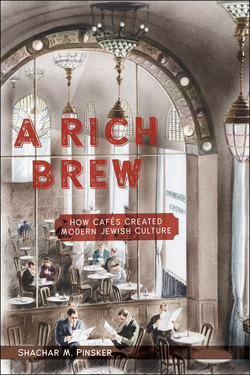A Rich Brew

Реклама. ООО «ЛитРес», ИНН: 7719571260.
Оглавление
Shachar M. Pinsker. A Rich Brew
Отрывок из книги
A RICH BREW
How Cafés Created Modern Jewish Culture
.....
One of the defining moments of that aborted revolution took place in Odessa: the rebellion that erupted on the Russian battleship Potemkin on June 14, 1905, immortalized by Sergei Eisenstein’s film The Battleship Potemkin (1925). A few months after these dramatic events, Tsar Nicholas II issued the October Manifesto, promising political reforms. A large pogrom, a wave of anti-Jewish violence, erupted in Odessa on October 18–22, 1905, in which at least four hundred Jews and one hundred non-Jews were killed and approximately three hundred people, mostly Jews, were injured. Around 1905, a new generation of Russian Jews—some born in Odessa, others who had migrated to the city—came of age and found their place within the city’s cultural life. The October pogrom and several others that followed it thoroughly shaped members of this new generation but did not dim their engagement with the city. Most of them felt thoroughly at home in Russian language, literature, and culture, and they made good literary use of the unique Russian dialect of Odessa, which was tinged with Yiddish and Hebrew and with influences of many other languages spoken in Odessa. Odessa continued to attract young people from the Pale of Settlement who wanted to bask in the light of the “Sages of Odessa,” but many of Odessa’s new writers and cultural figures, as well as its merchants and lower-class workers, were born in the city and proudly considered themselves to be real Odessits. Odessa cafés continued to play an important role in the city and in Jewish culture in the tumultuous and occasionally violent years around the revolution. Much of the writing in and about the café reflected on the changes that took place in Odessa and the tensions that abounded around the aborted revolution and the pogroms.54
The Jewish-Russian writer and journalist Vladimir Jabotinsky was born to an acculturated middle-class family in Odessa in the year 1880. The young Jabotinsky, who later became the leader of the Zionist Revisionist party in Palestine became the chief cultural correspondent for the prestigious Russian daily Odesskie novosti, writing many witty feuilletons. Jabotinsky used to sit in Odessa’s famous cafés, writing, observing, and gathering information about cultural events in the city, as well as in the simple Greek cafés near the port, which he especially liked. Years later, he wrote about the city in his semiautobiographical novel Pyatero (The Five, 1936).55 In the novel, Jabotinsky chronicles the lives of five children in the Milgrom family and their different orientations, choices, and fates. Many of the events in the novel take place in the center of Odessa, where “one could see the trading terraces” of the two most famous institutions, Café Fanconi and Café Robina, which were “noisy as the sea at a massif, filled to overflowing with seated customers, surrounded by those waiting to get in.”56
.....